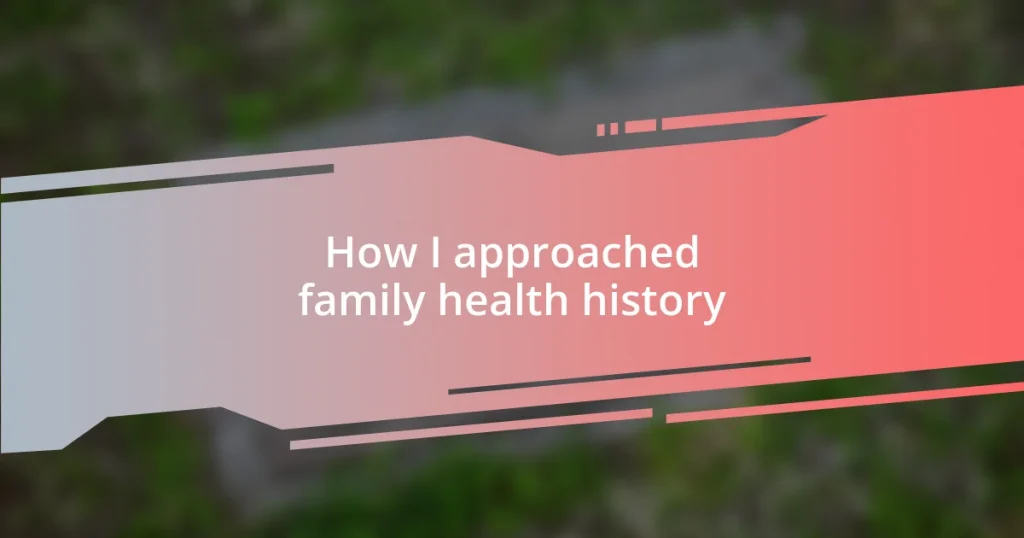Key takeaways:
- Understanding family health history can illuminate potential health risks and encourage proactive health decisions, fostering a culture of openness and support within families.
- Utilizing technology and tools for documenting family health histories enhances the ability to track health narratives and engage in meaningful conversations about health challenges.
- After gathering health histories, it’s important to evaluate the information, discuss it with healthcare professionals, and share knowledge with younger family members to promote long-term health awareness.
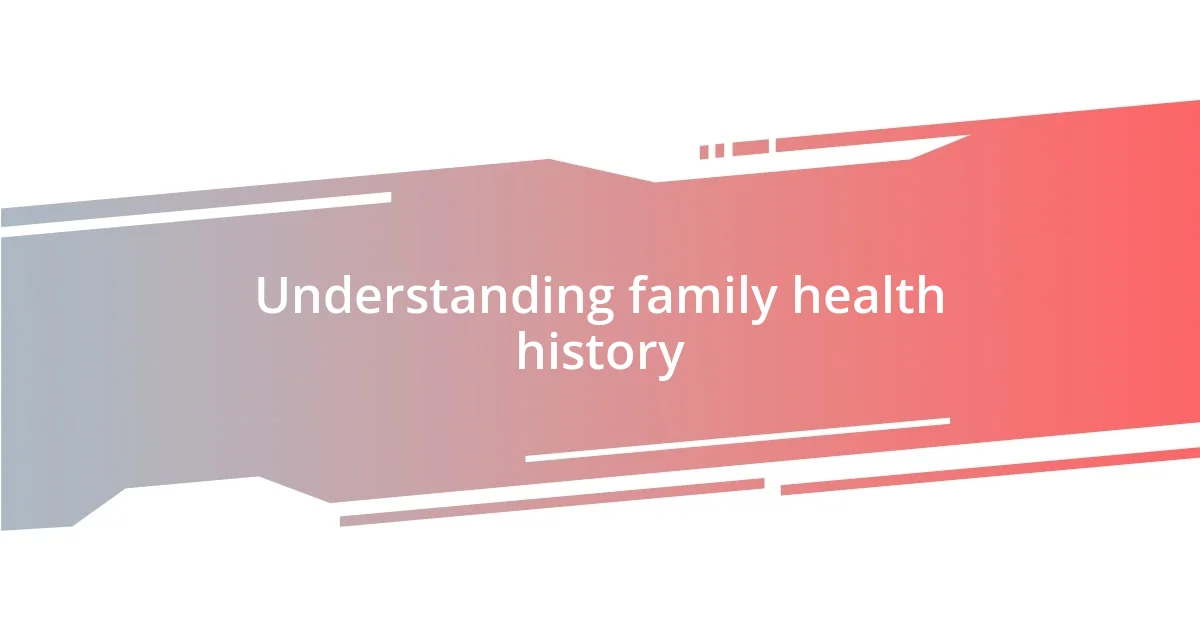
Understanding family health history
Understanding your family health history is like piecing together a puzzle that reveals not just genetic predispositions but also the narratives of those who came before you. I remember sitting down with my grandmother one afternoon, and as we flipped through old family photographs, she shared stories of health challenges faced by various relatives. This moment wasn’t just about nostalgia; it opened my eyes to the fact that our family’s health patterns can illuminate paths I might take in my own life.
Have you ever wondered why certain health issues seem to run in families? It’s fascinating to consider how behaviors, environments, and inherited traits intertwine. My own experience showed me that having discussions about health within my family was crucial. When I learned about my uncle’s battle with heart disease, it gave me pause to reflect on my own lifestyle choices. This connection between family narrative and personal responsibility can often guide one’s proactive health decisions.
Exploring family health history can be daunting, yet recounting those stories can empower us. During a family reunion, I noticed my cousin hesitating to discuss her struggle with anxiety, which made me realize how vital it is to foster a culture of openness about health. I ask you: What if sharing these stories not only educated us about our risks but also built a support system that reinforces our well-being? When we engage with our family’s health history, we not only discover patterns but also develop a deeper sense of connection and understanding with our loved ones.
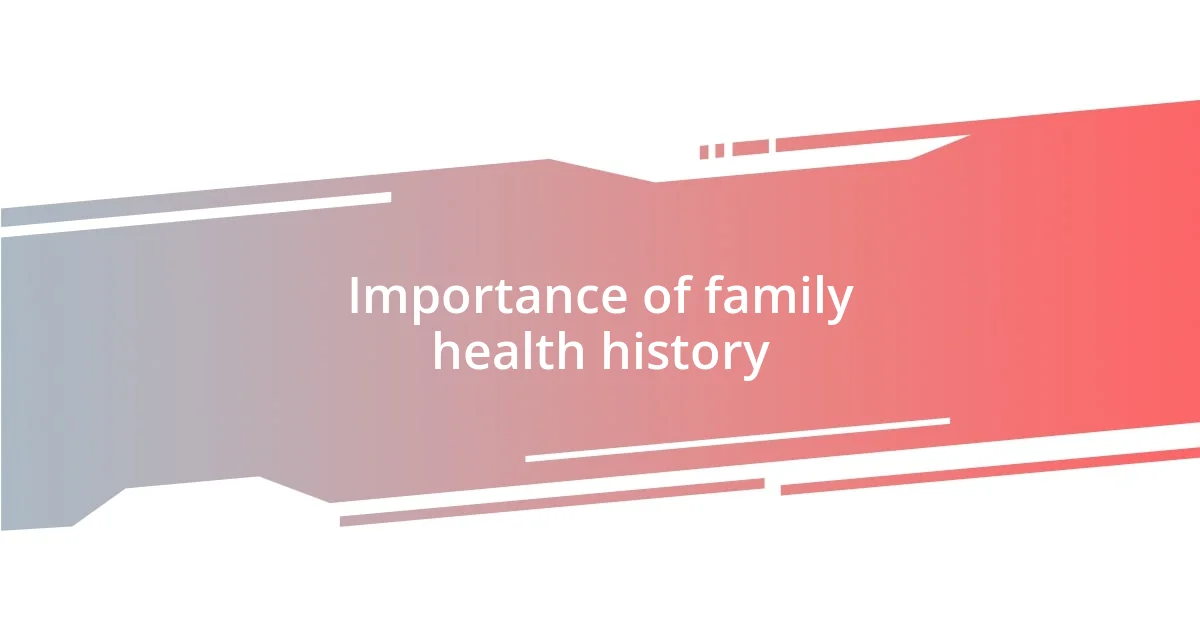
Importance of family health history
Understanding your family’s health history is crucial because it acts as a roadmap for your personal health journey. When I first learned that my mother had struggled with diabetes, it sparked a realization that I needed to pay more attention to my diet and exercise habits. This awareness prompted me to replace sugary snacks with healthier options. This proactive approach not only benefited my health but also strengthened my relationship with my family as we began to discuss our wellness journeys more openly.
Moreover, the significance of family health history extends beyond just genetics; it influences lifestyle choices and preventive measures. After discovering that multiple relatives faced issues with high blood pressure, I began to incorporate stress-reduction techniques into my daily life. I took up yoga and meditation, which not only improved my physical health but also provided a much-needed emotional outlet. I encourage you to ask your family about their health challenges. It could teach you not just about potential risks, but also about strategies they employed to lead healthier lives.
In addition to being informative, family health history can foster an environment of support and understanding. I recall when my brother confided in me about his anxiety issues, and sharing that moment gave us both the courage to seek help together. These conversations can be transformative, laying the groundwork for a more connected family dynamic that values openness and collective well-being. Engaging with family health narratives is not just about identifying risks; it’s also about cultivating resilience and support systems within our families.
| Genetic Factors | Environmental Influences |
|---|---|
| Can indicate predisposition to certain conditions | Can impact overall health and wellness |
| Informs preventative measures | Includes lifestyle habits and exposure to toxins |
| Shapes personal health decisions | Affects family behavioral patterns |
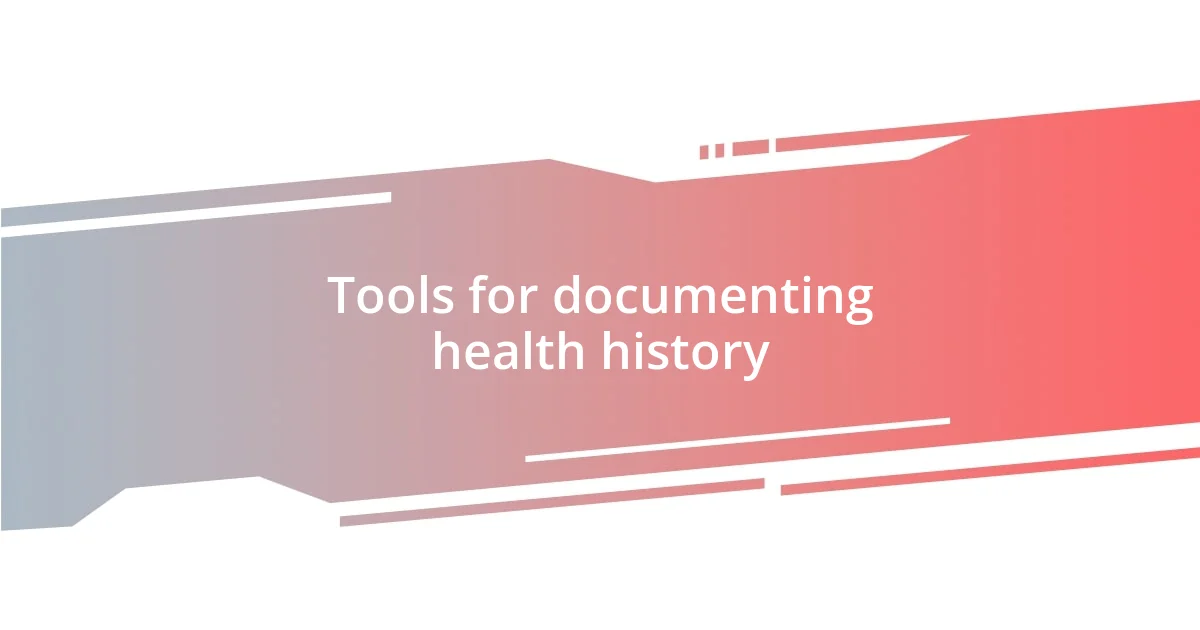
Tools for documenting health history
When it comes to documenting family health history, there are several effective tools that can make this often complex task easier. Personally, I found that utilizing technology can transform how we capture and track our family’s health narratives. Mobile applications and digital platforms, like My Family Health Portrait, provide structured templates for recording health information, which can streamline conversations and ensure nothing is overlooked. I also made sure to take notes during family gatherings, jotting down relevant health details shared during casual chats. This not only keeps the information organized but also helps me reflect on it later.
Here are some valuable tools to consider:
- Genealogy Apps: These can help document health histories alongside family trees.
- Health History Forms: Printable forms can simplify the collection of information from relatives.
- Family Health Journals: Keeping a dedicated notebook for health conversations encourages ongoing dialogue.
- Online Portals: Websites that allow families to input health data collaboratively can aid in comprehensive history tracking.
Engaging with these tools made me realize how much I cherish these moments of connection with my family. One time, I sat down with my aunt and uncle, and as we filled out a family health history form, we stumbled upon long-forgotten stories of relatives who overcame serious illnesses. This shared experience not only unearthed valuable health insights but also strengthened our bond, reminding me that documenting such histories can be just as meaningful as the details themselves.
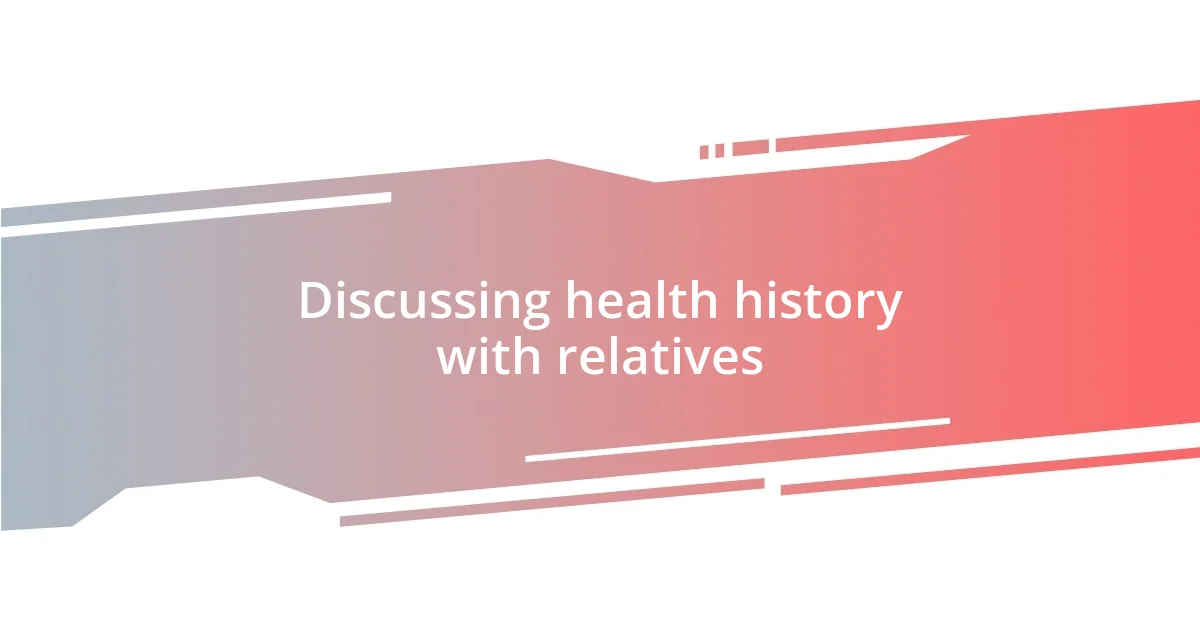
Discussing health history with relatives
Discussing health history with relatives can sometimes feel daunting, yet it’s a conversation that can be incredibly rewarding. I remember sitting down with my grandparents one evening, eager to learn about their experiences. As they shared stories about their health challenges, I realized that their wisdom wasn’t just about avoiding diseases; it was also filled with lessons on resilience and adaptation. Have you ever thought about how much you can learn from these narratives? It’s amazing how personal experiences can shape not just our understanding of health, but also the values we hold dear.
In another instance, I was curious about my father’s history with heart disease. Opening that dialogue was a delicate balance—I wanted to be respectful while also digging deeper. Our conversation led to him reminiscing about his favorite hobbies, like hiking, that he had set aside due to his health. I couldn’t help but feel a sense of urgency to encourage him to get back out there, and in turn, it reignited my passion for outdoor activities too. Isn’t it fascinating how these discussions can spark not only awareness but action?
It’s essential to create a comfortable environment when tackling these topics. One Thanksgiving, I set up a “health history” roundtable, where family members could share their stories over dinner. It turned out to be more than just health information; we laughed, cried, and connected on a deeper level. The atmosphere of sharing made the health revelations feel lighter, like a collective journey toward better living. How do you think your family would react to such openness? In my case, it solidified our bond and turned what could have been difficult conversations into a celebration of our shared histories.
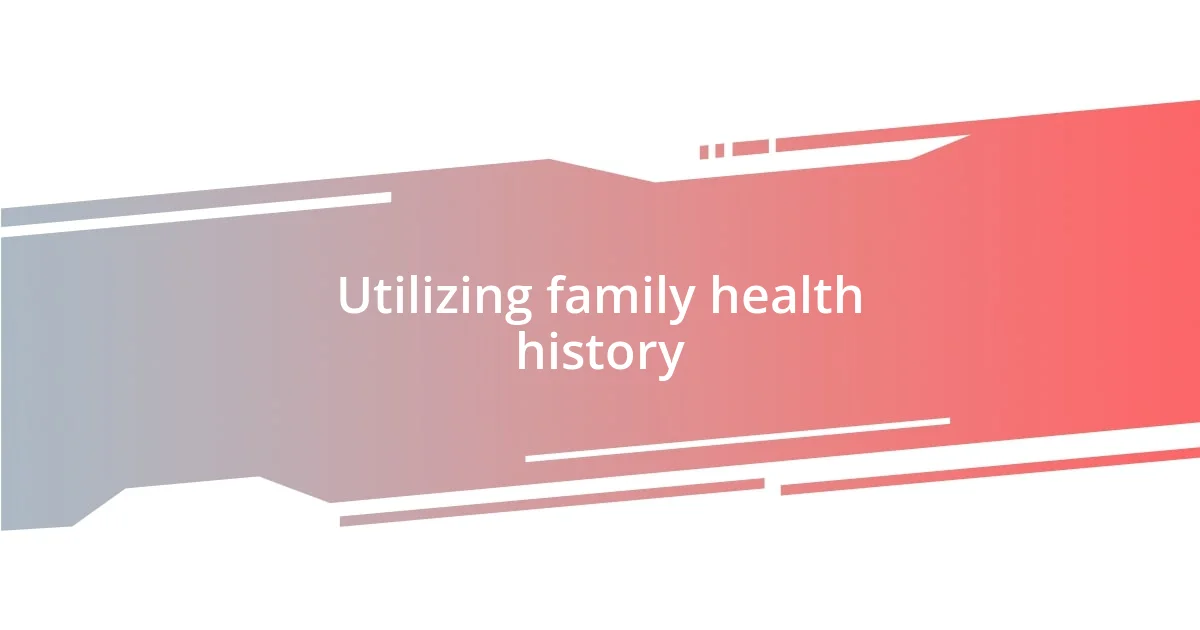
Utilizing family health history
Utilizing family health history is more than just a task; it can be an enlightening experience that unites family members. I recall a family gathering where I took the opportunity to dive deeper into our health narratives. As I asked pointed questions about my cousin’s struggles with diabetes, the room buzzed with stories from relatives who had faced similar issues. I couldn’t help but marvel at the threads of connection woven through our shared experiences. How often do we skip over the rich context of our family’s health?
Gathering this information isn’t just beneficial for me, but for everyone involved. I once invited my siblings to compare our health histories, and we discovered patterns that had gone unnoticed. It was eye-opening to see how some traits, like high blood pressure or allergies, echoed across generations. I remember feeling a wave of gratitude; having this knowledge empowered us all to take proactive steps. Have you ever considered how shared knowledge can impact your family dynamics?
The emotional aspect of discussing family health is significant. One evening, while researching online health archives, I stumbled upon startling statistics about hereditary cancers. I felt compelled to reach out to my mom, who had always brushed off her own family’s history of breast cancer. Our conversation turned into tears and revelations, opening doors to preventive measures we could explore together. Reflecting on these experiences, I realize that sometimes the toughest discussions can lead to the most profound understanding and, ultimately, better health choices for our loved ones. Isn’t that an empowering realization?
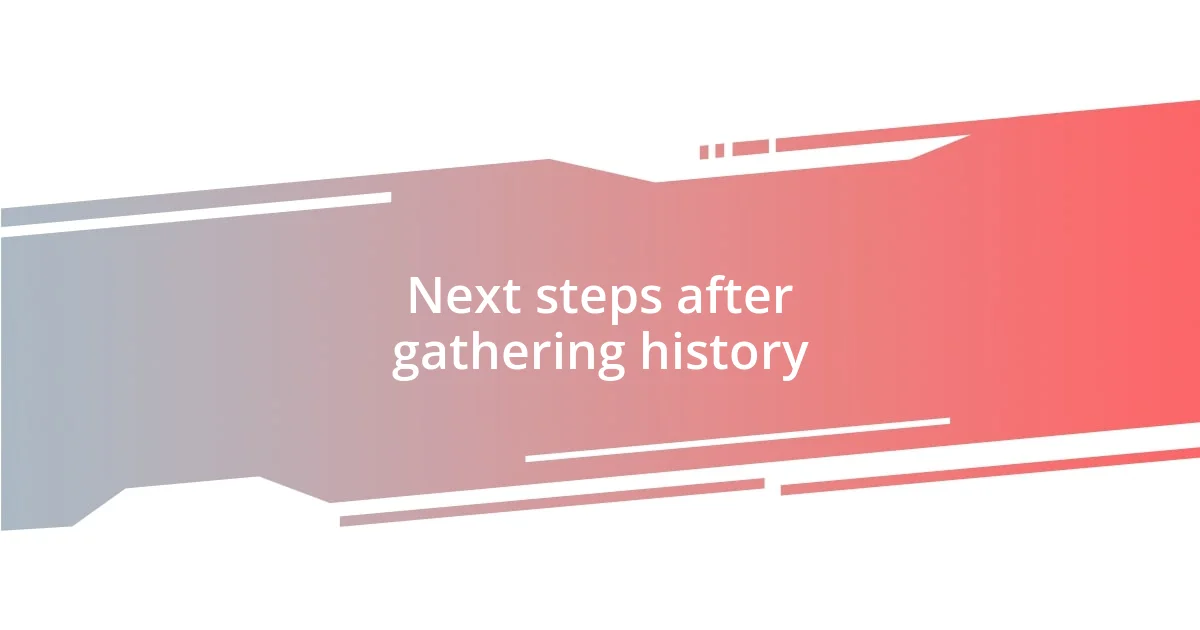
Next steps after gathering history
After gathering your family health history, one of the most crucial next steps is to evaluate the information you’ve collected. I vividly remember reviewing my notes one evening and noticing patterns that seemed to run through generations—like my grandmother’s struggles with arthritis. This piqued my curiosity about environmental and lifestyle factors that might be at play. Have you ever taken a moment to reflect on how these patterns might affect your own health choices?
Once you’ve identified key health issues, consider discussing them with a healthcare professional. I recall a time when I took my family history to my doctor, who was able to provide tailored advice on screenings and lifestyle changes. It was illuminating to see how personalized care could stem from our conversations around the dining table. Isn’t it incredible how understanding your family’s past can empower you to take charge of your future health?
Additionally, sharing this information with younger family members is vital. After gathering our family’s health history, I made it a point to have a family health night with my children. We talked about what we learned, and I felt a real sense of responsibility to equip them with the knowledge they might need. How do you think your kids would react if you opened that door for discussion? From my experience, fostering this awareness in the next generation can create a culture of health that lasts for years to come.










